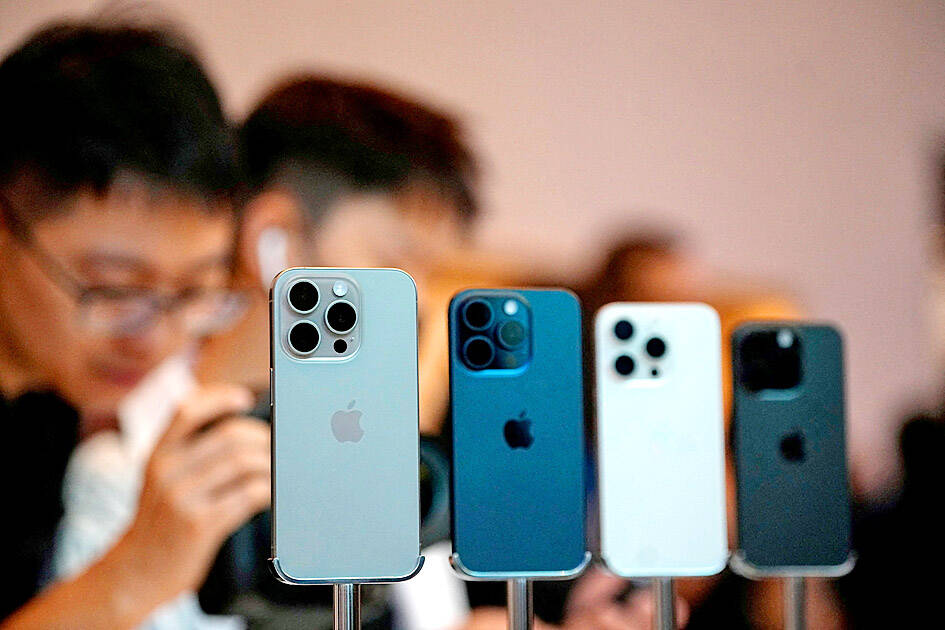Apple Inc on Saturday said that recent claims of new iPhones getting too hot to the touch are due to software and app-related bugs, and that fixes are coming soon.
The company said the device can get warm in the first few days as it works overtime to get set up and restore a user’s data, due to a bug in the latest iOS 17 software, and because of some third-party apps overloading the system.
Apple told Bloomberg it is working with developers behind the apps causing the iPhone to overheat and that fixes are in the process of being released. A spokesman said that Instagram from Meta Platforms Inc, Uber Technologies Inc’s app and the game Asphalt 9: Legends have caused the device to run warmer than normal. Instagram already mitigated the problem with its app on Wednesday, Apple said.

Photo: Reuters
The latest high-end device includes a titanium frame, a first for the iPhone, as well as an A17 Pro chip with an enhanced graphics component for improved gaming. Some researchers said those hardware changes could have contributed to the issue.
Yet Apple denied that the problem is related to the hardware of the iPhone 15 Pro line, saying that the new design results in improved heat dissipation compared with prior stainless steel devices. It also said that the upcoming software fix will not involve slowing down the processor of the latest models.
Apple also said the issue is not a safety problem and would not impact the performance of the iPhone. It added that USB-C charging, the new standard included with the latest models, is not a cause of the overheating. It did, however, say that the use of a large charging adapter — those that offer more than 20 watts — could cause iPhones to temporarily feel hotter than usual.
Apple did not say when the iOS 17 software update would be available or which version it would carry. The company last week released the first beta version of iOS 17.1 to app developers. That release is scheduled for later this month.

TECH BOOST: New TSMC wafer fabs in Arizona are to dramatically improve US advanced chip production, a report by market research firm TrendForce said With Taiwan Semiconductor Manufacturing Co (TSMC, 台積電) pouring large funds into Arizona, the US is expected to see an improvement in its status to become the second-largest maker of advanced semiconductors in 2027, Taipei-based market researcher TrendForce Corp (集邦科技) said in a report last week. TrendForce estimates the US would account for a 21 percent share in the global advanced integrated circuit (IC) production market by 2027, sharply up from the current 9 percent, as TSMC is investing US$65 billion to build three wafer fabs in Arizona, the report said. TrendForce defined the advanced chipmaking processes as the 7-nanometer process or more

China’s Huawei Technologies Co (華為) plans to start mass-producing its most advanced artificial intelligence (AI) chip in the first quarter of next year, even as it struggles to make enough chips due to US restrictions, two people familiar with the matter said. The telecoms conglomerate has sent samples of the Ascend 910C — its newest chip, meant to rival those made by US chipmaker Nvidia Corp — to some technology firms and started taking orders, the sources told Reuters. The 910C is being made by top Chinese contract chipmaker Semiconductor Manufacturing International Corp (SMIC, 中芯) on its N+2 process, but a lack

Who would not want a social media audience that grows without new content? During the three years she paused production of her short do-it-yourself (DIY) farmer’s lifestyle videos, Chinese vlogger Li Ziqi (李子柒), 34, has seen her YouTube subscribers increase to 20.2 million from about 14 million. While YouTube is banned in China, her fan base there — although not the size of YouTube’s MrBeast, who has 330 million subscribers — is close to 100 million across the country’s social media platforms Douyin (抖音), Sina Weibo (新浪微博) and Xiaohongshu (小紅書). When Li finally released new videos last week — ending what has

OPEN SCIENCE: International collaboration on math and science will persevere even if the incoming Trump administration imposes strict controls, Nvidia’s CEO said Nvidia Corp CEO Jensen Huang (黃仁勳) said on Saturday that global cooperation in technology would continue even if the incoming US administration imposes stricter export controls on advanced computing products. US president-elect Donald Trump, in his first term in office, imposed restrictions on the sale of US technology to China citing national security — a policy continued under US President Joe Biden. The curbs forced Nvidia, the world’s leading maker of chips used for artificial intelligence (AI) applications, to change its product lineup in China. The US chipmaking giant last week reported record-high quarterly revenue on the back of strong AI chip